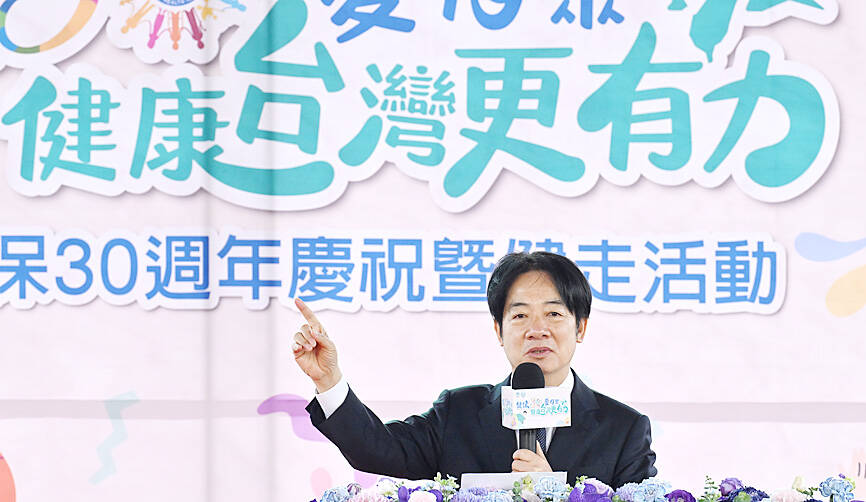An “unequal pay for unequal work” structure should be considered for National Health Insurance (NHI) payments as a possible solution to healthcare worker shortages in some hospital departments, President William Lai (賴清德) said yesterday in a speech at an NHI 30th anniversary event at the Taipei Expo Park.
Lai thanked former health officials who helped establish the NHI system, as well as the “continuous effort” of healthcare workers, for keeping the NHI system functioning for 30 years.
The system is important for achieving health equity and ensuring people of different ethnicities, genders, ages and economic statuses can receive equal healthcare, Lai said, adding that it has also extended life expectancies, and allowed people to spend less on healthcare and instead invest in education or innovation, driving Taiwan’s social development.

Photo: Liu Hsin-de, Taipei Times
Taiwan’s public health and healthcare services have often been ranked top in international accreditations and the nation’s prudent disease prevention policies have also earned international praise, he said.
The government must consider how to keep the system running and improve healthcare services, so his administration has set up the Healthy Taiwan Promotion Committee, expanded funding and eligibility for cancer screening, introduced a new cancer drugs fund, pushed forward a “three-highs” prevention program and is establishing a ministry of sports, he said.
However, the government must also solve problems that the NHI faces, including a shortage of doctors, he said.
Dentistry has outstripped medicine among high-school graduates choosing a university major, hinting a more serious shortage of doctors might await, Lai said.
“We must solve this problem,” he said. “I think we should consider the idea of ‘unequal pay for unequal work.’”
The NHI payment system runs on the edicts of “equal pay for unequal work” and “case rate payments,” but the government should consider making a structural adjustment, or physicians will be unwilling to take up more difficult specialties, he said.
Lai said that he recently spoke with an internationally renowned reconstructive surgeon, who asked him to guess how much they were paid from the NHI for an eight-to-10-hour surgery.
He imagined that they perhaps received NT$100,000 to NT$200,000, but the surgeon said it was only NT$60,000 to NT$80,000, Lai said.
“The [doctor shortage] problem is very serious,” Lai said, adding that he has discussed the issue with the minister of health and welfare and the NHI Administration’s [NHIA] director-general.”
“We must brainstorm ideas with many people to find solutions,” he said.
Speaking with reporters on the sidelines of the event, NHIA Director-General Shih Chung-liang (石崇良) said that “unequal pay for unequal work” can be divided into two dimensions: location and department.
The current system provides bonuses to healthcare services on outlying islands and in remote areas, Shih said, adding that the NHI has recently adjusted payments for emergency departments and is mulling adjustments to outpatient consultation fees according to department, and depending on whether a diagnosis is “normal” or “complicated.”
The issue would be discussed with specialists, decided by consensus and forwarded to the ministry for approval, he added.
Additional reporting by CNA

“China is preparing to invade Taiwan,” Deputy Minister of Foreign Affairs Francois Wu (吳志中) said in an exclusive interview with British media channel Sky News for a special report titled, “Is Taiwan ready for a Chinese invasion?” the Ministry of Foreign Affairs said today in a statement. The 25-minute-long special report by Helen Ann-Smith released yesterday saw Sky News travel to Penghu, Taoyuan and Taipei to discuss the possibility of a Chinese invasion and how Taiwan is preparing for an attack. The film observed emergency response drills, interviewed baseball fans at the Taipei Dome on their views of US President

The Central Weather Administration (CWA) today issued a "tsunami watch" alert after a magnitude 8.7 earthquake struck off the Kamchatka Peninsula in northeastern Russia earlier in the morning. The quake struck off the east coast of the Kamchatka Peninsula at 7:25am (Taiwan time) at a depth of about 19km, the CWA said, citing figures from the Pacific Tsunami Warning Center. The CWA's Seismological Center said preliminary assessments indicate that a tsunami could reach Taiwan's coastal areas by 1:18pm today. The CWA urged residents along the coast to stay alert and take necessary precautions as waves as high as 1m could hit the southeastern

The National Museum of Taiwan Literature is next month to hold an exhibition in Osaka, Japan, showcasing the rich and unique history of Taiwanese folklore and literature. The exhibition, which is to run from Aug. 10 to Aug. 20 at the city’s Central Public Hall, is part of the “We Taiwan” at Expo 2025 series, highlighting Taiwan’s cultural ties with the international community, National Museum of Taiwan Literature director Chen Ying-fang (陳瑩芳) said. Folklore and literature, among Taiwan’s richest cultural heritages, naturally deserve a central place in the global dialogue, Chen said. Taiwan’s folklore would be immediately apparent at the entrance of the

ECONOMIC BENEFITS: The imports from Belize would replace those from Honduras, whose shrimp exports have dropped 67 percent since cutting ties in 2023 Maintaining ties with Taiwan has economic benefits, Ministry of Foreign Affairs officials said yesterday, citing the approval of frozen whiteleg shrimp imports from Belize by the Food and Drug Administration (FDA) as an example. The FDA on Wednesday approved the tariff-free imports from Belize after the whiteleg shrimp passed the Systematic Inspection of Imported Food, which would continue to boost mutual trade, the ministry said. Taiwan’s annual consumption of whiteleg shrimps stands at 30,000 tonnes, far exceeding domestic production, the ministry said. Taiwan used to fill the gap by importing shrimps from Honduras, but purchases slumped after Tegucigalpa severed diplomatic ties with Taiwan